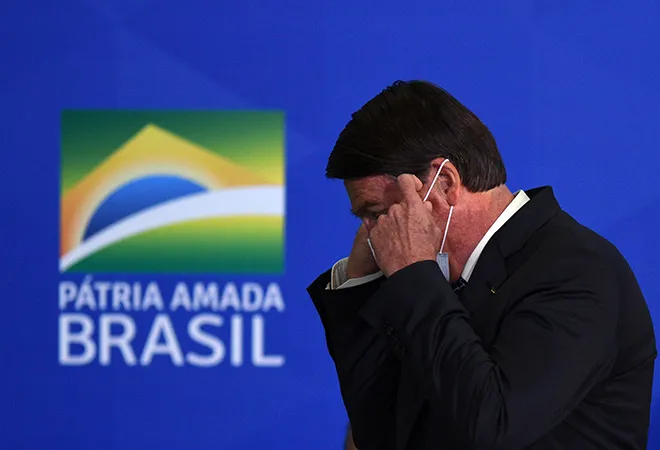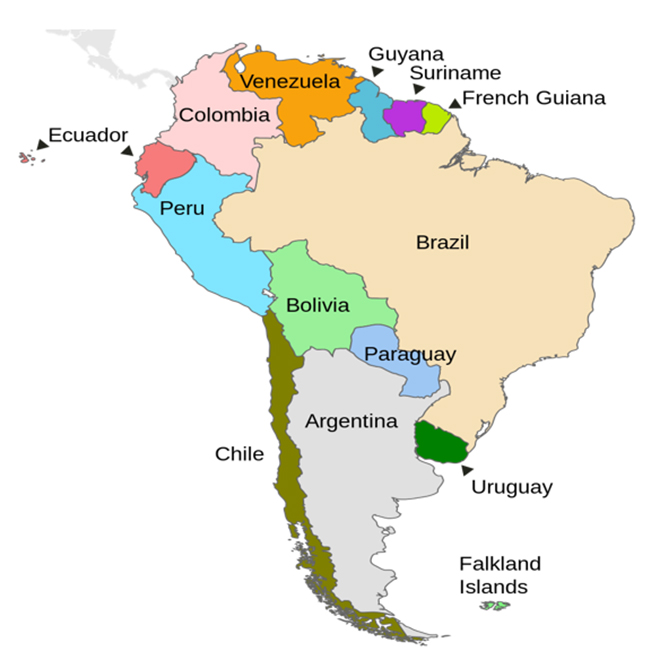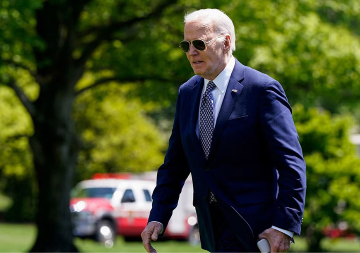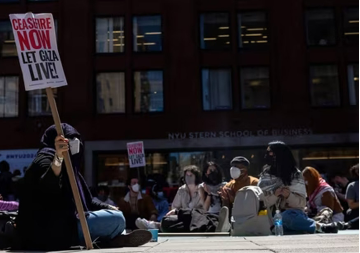
Before the COVID-19 pandemic brought the world to a standstill, Brazil had been deemed an emerging power. Brazil has always been influential throughout Latin America because of its territorial size, wealth of resources, economy and large population. The strategic dialogue and cooperative steps taken by Brazil in the recent years has been supported by most of the major countries. The work that Brazil has done in helping candidates of the presidential elections of other countries win by supporting them on a public platform — such as Venezuela and Peru — has also deepened its ties to those countries.
Here we focus on the spread and effects of the COVID-19 virus across Brazil as well as its impact on the regional dynamics in Latin America. The COVID-19 outbreak started in Latin America on 26 February, when Brazil confirmed a case in São Paulo, with many other cases beginning to appear in other countries in the subsequent weeks.
The spread of COVID-19 in Brazil
São Paulo — where the first case was reported — is the most populated city in South America, with more than 23 million people high land, sea and air connectivity all over Latin America as well as North America, Europe, Africa and the Middle East. Thus, as was the course of the next few days, a significant increase of cases in the country was seen. On 19 June 2020, the country reported its 1 millionth case; at this time, there had been nearly 49,000 reported deaths. In June 2020, Brazil had the second-highest number of confirmed COVID-19 cases in the world behind the USA. On 17 July 2020, the country reported its
2 millionth case.
Although the severity of this pandemic could be seen, the response from President Jair Bolsonaro, despite repeated warnings from the WHO and various health experts, was to downplay the impact of this pandemic.
The healthcare systems in Brazil is fragile, and as a result its COVID-19 response has suffered. There are only
11,302 exclusive ICU beds for COVID cases (till date) for a population that has already surpassed
200 million. Multiple social issues, such as rising crimes, poverty and lack of education have made it difficult to contain the spread of the pandemic and spread awareness about the same. Economic challenges in the form of a severe fiscal crisis, increased budget deficit, falling GDP and rise in unemployment has also impacted the situation adversely. Further,
the massive evacuation from Venezuela to many countries in the region due to their failing healthcare system, hyperinflation and shortage of food, has resulted in an influx of people in a country that is already densely populated. The burden of COVID-19, is an additional challenge for the healthcare systems and economies in the region, as they face other infectious disease outbreaks like Zika and Chikungunya.
Although the severity of this pandemic could be seen, the response from President Jair Bolsonaro, despite repeated warnings from the WHO and various health experts, was to downplay the impact of this pandemic. He described the threat of COVID-19 as being exaggerated and this made it impossible to frame discuss strategies to contain the pandemic at the political level.
On 7 July, after announcing that he had tested positive, Bolsonaro continued to criticise lockdown measures, arguing
that “the majority of Brazilians contract this virus and don’t notice a thing,” and
that “You can't just talk about the consequences of the virus that you have to worry about. Life goes on. Brazil needs to produce. You need to get the economy in gear.”
The local governments also took rapid response measures and closed all public areas including but not limited to schools, theatres and malls, inciting a negative response from President Bolsonaro wherein he criticised these essential measures.
While the presidential response has been criticised worldwide, the Minister of Economy, Paulo Guedes, announced an economic stimulus package of US$ 150 billion (R$ 750 billion), on 26 March, to face the economic impacts of COVID-19 in Brazil. The local governments also took rapid response measures and closed all public areas including but not limited to schools, theatres and malls, inciting a negative response from President Bolsonaro wherein he criticised these essential measures. On 21 May, the Ministry of Health together with the national councils of Health Secretaries (CONASS) and Municipal Health Secretariats (CONASEMS), allocated States and municipalities with
R$ 2.2 billion for COVID-19, R$ 2 billion for the holy, non-profit philanthropic hospitals and hospitals that are affiliated with the
publicly funded health care system of Brazil,
The Sistema Único de (SUS), to combat COVID-19. While these measures would go a long way for a short-term solution, a much more thought out plan is needed for the long term.
Impact of Brazil’s COVID-19 response on regional dynamics
Brazil shares a border with 10 countries in Latin America. Fearing cross-border transmission due to Brazil’s delayed response, countries like Argentina and Venezuela imposed border restrictions as soon as possible. Brazilian states like Roraima and Amapá have virtually open borders with Venezuela and French Guiana, respectively, which makes it challenging to control virus transmission from one country to another since there is frequent cross border travel, because of commercial and people to people ties between border residents of the countries.
 This photo by Unknown Author is licensed under CC BY-SA.
This photo by Unknown Author is licensed under CC BY-SA.
Brazil and Argentina — the two major countries in Latin America — have differed on key issues over the last few months. The political differences have accelerated since the Argentine presidential elections in 2019, in which Bolsonaro publicly supported the opposition party candidate and called the current government “
leftwing bandits.” The diverging approaches of both countries towards COVID-19 along with the disagreements between the presidents of both countries, has led to this outcome. Former Argentine ambassador to Brazil,
Juan Pablo Lohlé, has also gone on record to say that the differences in the approaches to COVID-19 virus as well as a differentiated opinion in ideologies has prevented substantial coordination between the two countries.
Brazil and Argentina — the two major countries in Latin America — have differed on key issues over the last few months.
The political tensions between both the countries have worsened and that has led to a fall in bilateral relations between them. According to Argentine Republic Chamber of Exporters (CERA), China was Argentina’s main trading partner in April replacing Brazil. Trade between Argentina and Brazil fell 4.7% in April, the biggest decline since February 2009, according to the Ministry of Economy of Argentina.
MERCOSUR, the South American trade bloc comprising of Brazil, Argentina, Uruguay and Paraguay has frozen. This has deepened the economic crisis that Argentina has been suffering since 2018 and its inability to trade in the pandemic has exacerbated the conditions. While an effort was made in the early months of the pandemic to fight it together, the announcement of Argentina to pull out of the MERCOSUR agreement has been quite a shock, so to speak. This has also called into question the trade bloc’s future, since all the countries seem to be focusing inwards with a protectionist policy.
At the time when countries around Brazil were closing their borders, Brazil’s administration was the last to take the decision and even so partially.
The huge influx of Venezuelans amongst others, overburdened an already declining state of affairs for the Brazilian healthcare system.
While Brazil has taken a direct approach to eliminate import licenses and offer priority treatment to medical supplies it will take a long time to repair some of the damage done to the relations between countries as well as for the Brazilian economy to recover. Therefore, political leaders and stakeholders should set aside their issues and work together on providing a long-term solution to the pandemic and its repercussions.
The author is a research intern at ORF.
The views expressed above belong to the author(s). ORF research and analyses now available on Telegram! Click here to access our curated content — blogs, longforms and interviews.



 Before the COVID-19 pandemic brought the world to a standstill, Brazil had been deemed an emerging power. Brazil has always been influential throughout Latin America because of its territorial size, wealth of resources, economy and large population. The strategic dialogue and cooperative steps taken by Brazil in the recent years has been supported by most of the major countries. The work that Brazil has done in helping candidates of the presidential elections of other countries win by supporting them on a public platform — such as Venezuela and Peru — has also deepened its ties to those countries.
Here we focus on the spread and effects of the COVID-19 virus across Brazil as well as its impact on the regional dynamics in Latin America. The COVID-19 outbreak started in Latin America on 26 February, when Brazil confirmed a case in São Paulo, with many other cases beginning to appear in other countries in the subsequent weeks.
Before the COVID-19 pandemic brought the world to a standstill, Brazil had been deemed an emerging power. Brazil has always been influential throughout Latin America because of its territorial size, wealth of resources, economy and large population. The strategic dialogue and cooperative steps taken by Brazil in the recent years has been supported by most of the major countries. The work that Brazil has done in helping candidates of the presidential elections of other countries win by supporting them on a public platform — such as Venezuela and Peru — has also deepened its ties to those countries.
Here we focus on the spread and effects of the COVID-19 virus across Brazil as well as its impact on the regional dynamics in Latin America. The COVID-19 outbreak started in Latin America on 26 February, when Brazil confirmed a case in São Paulo, with many other cases beginning to appear in other countries in the subsequent weeks.

 PREV
PREV

